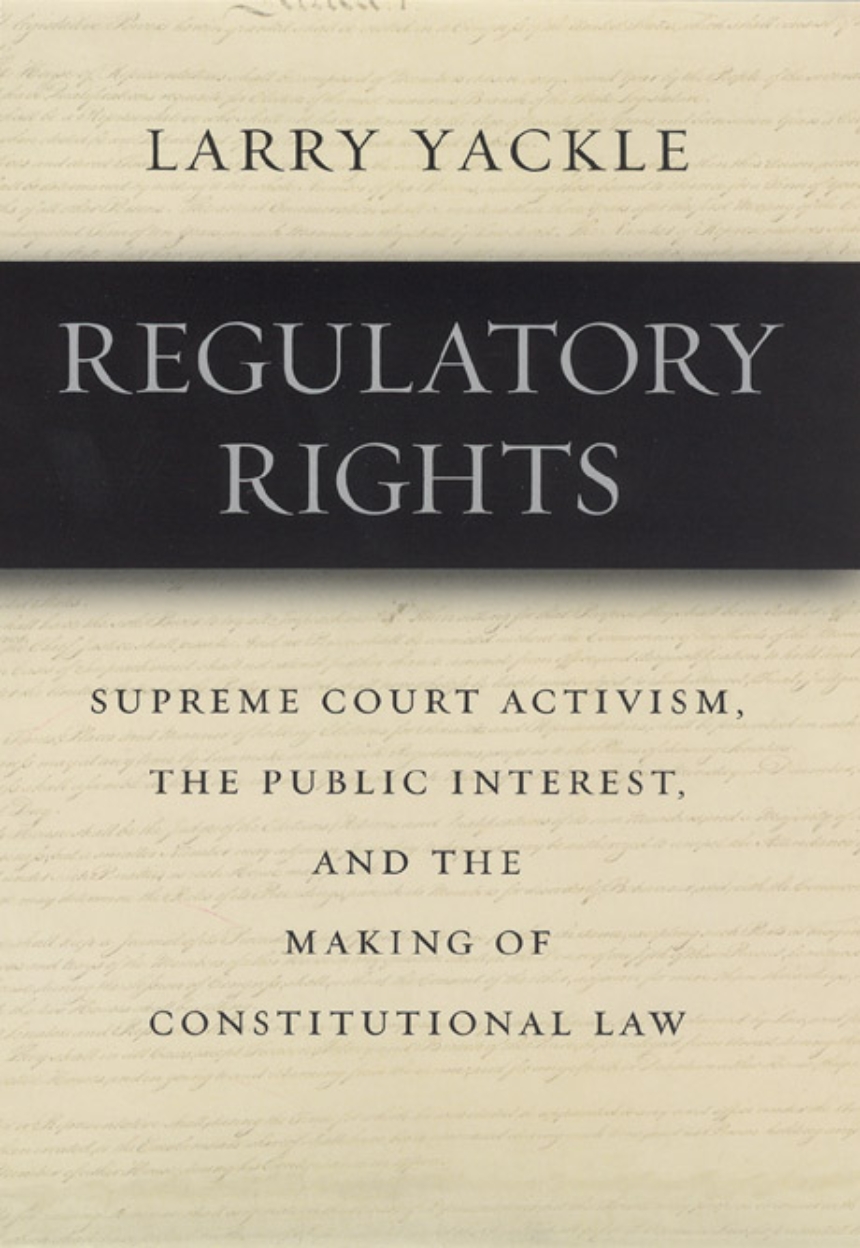Regulatory Rights
Supreme Court Activism, the Public Interest, and the Making of Constitutional Law
9780226944715
9780226944739
Regulatory Rights
Supreme Court Activism, the Public Interest, and the Making of Constitutional Law
We often hear—with particular frequency during recent Supreme Court nomination hearings—that justices should not create constitutional rights, but should instead enforce the rights that the Constitution enshrines. In Regulatory Rights, Larry Yackle sets out to convince readers that such arguments fundamentally misconceive both the work that justices do and the character of the American Constitution in whose name they do it. It matters who sits on the Supreme Court, he argues, precisely because justices do create individual constitutional rights.
Traversing a wide range of Supreme Court decisions that established crucial precedents about racial discrimination, the death penalty, and sexual freedom, Yackle contends that the rights we enjoy are neither more nor less than what the justices choose to make of them. Regulatory Rights is a bracing read that will be heatedly debated by all those interested in constitutional law and the judiciary.
Traversing a wide range of Supreme Court decisions that established crucial precedents about racial discrimination, the death penalty, and sexual freedom, Yackle contends that the rights we enjoy are neither more nor less than what the justices choose to make of them. Regulatory Rights is a bracing read that will be heatedly debated by all those interested in constitutional law and the judiciary.
256 pages | 6 x 9 | © 2007
Law and Legal Studies: General Legal Studies, Law and Society, Legal Thought, The Constitution and the Courts
Reviews
Table of Contents
Acknowledgments
Introduction
Chapter 1. The Documentary Constitution
Chapter 2. Constitutional Common Law
Chapter 3. Regulatory Rights
Chapter 4. Rational Instrumentalism
Conclusion
Notes
Introduction
Chapter 1. The Documentary Constitution
Constitutional Law
Explanations
Explanations
The Constancy of a Writing
The Legitimacy of a Compact
The Legitimacy of a Compact
A Constitution Made by Judges
Textualism
Textualism
Yawning Gaps
Vague and Ambiguous Terms
The Analogy to Statutes
The Text Writ Large
The Text in Context
Negative Examples
Vague and Ambiguous Terms
The Analogy to Statutes
The Text Writ Large
The Text in Context
Negative Examples
Originalism
The Framers
The Founding Generation
More Negative Examples
The Founding Generation
More Negative Examples
Chapter 2. Constitutional Common Law
Rights
Natural Rights
Rights and Formalism
The Positive Present
Rights and Formalism
The Positive Present
Markets
The Unregulated Baseline
The Regulatory Present
The Regulatory Present
The Public Interest
Natural Rights (Again)
The Police Power
The Police Power
Formalism (Again)
Laissez Faire
Class Legislation
Laissez Faire
Class Legislation
Efficiency and Elections
Chapter 3. Regulatory Rights
Preliminaries
Restraints Neither Internal nor External
Regulatory Rights in the Literature
Regulatory Rights in the Literature
Due Process
The Substance of Process
Market Freedom
Fundamental Interests
Market Freedom
Fundamental Interests
Procedural Rights
Substantive Rights
Beyond the Bill of Rights
Substantive Rights
Beyond the Bill of Rights
Abusive Behavior
Equal Protection
Equality and Purpose
The Overlap with Due Process
Classifications
The Overlap with Due Process
Classifications
Ordinary Classifications
Fundamental Interests (Again)
Suspicious Classifications
Fundamental Interests (Again)
Suspicious Classifications
Freedom of Expression
Free Speech
Freedom of Religion
Freedom of Religion
Cruel and Unusual Punishments
Chapter 4. Rational Instrumentalism
Standards of Review
The Rational Basis Test
Close Scrutiny
Close Scrutiny
Means
The Level-of-Generality Question
Disproportionate Impact
Knowing a Means by Its Purpose
Disproportionate Impact
Knowing a Means by Its Purpose
Individual Interests
Rights (Again)
The Level-of-Generality Question (Again)
The Level-of-Generality Question (Again)
Ends
The Search for Purpose
Techniques
Illustrations
Illustrations
A Purpose to Work With
Compelling Objectives
Impermissible Explanations
Compelling Objectives
Impermissible Explanations
Tautological Ends
Of Conduct and Status
Of Conduct and Status
Conclusion
Notes
